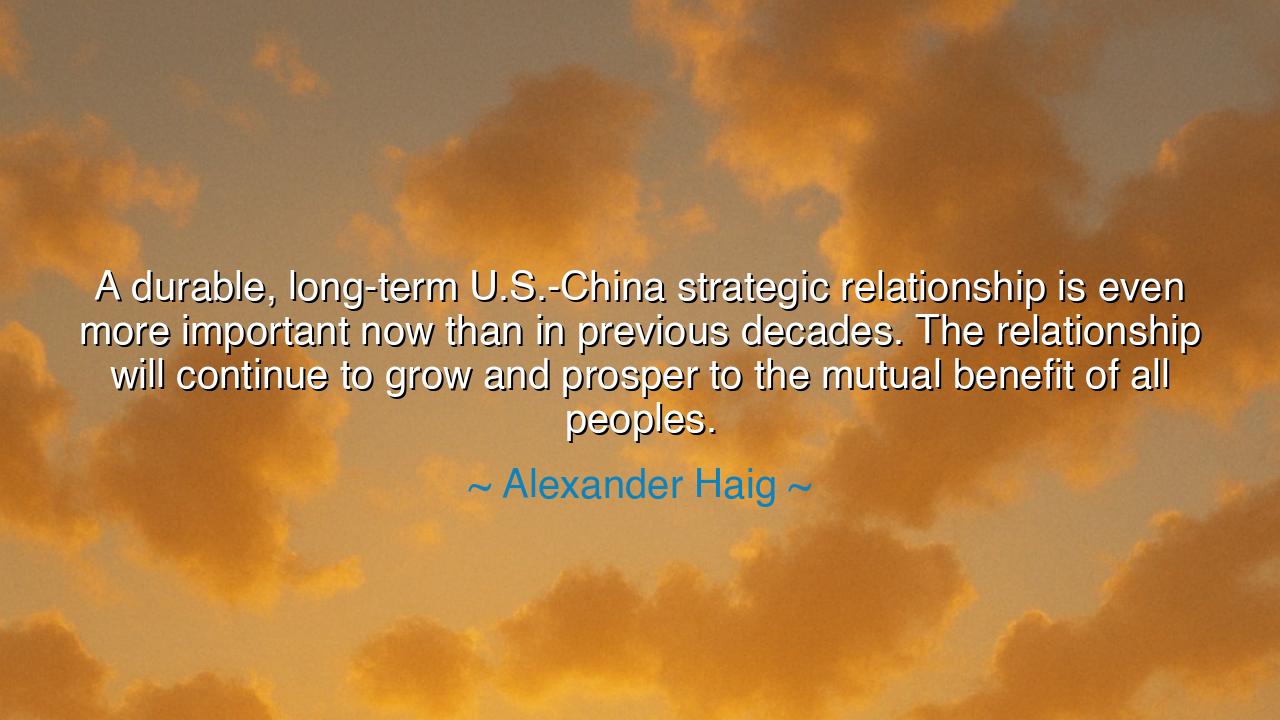
A durable, long-term U.S.-China strategic relationship is even
A durable, long-term U.S.-China strategic relationship is even more important now than in previous decades. The relationship will continue to grow and prosper to the mutual benefit of all peoples.






The words of Alexander Haig—“A durable, long-term U.S.-China strategic relationship is even more important now than in previous decades. The relationship will continue to grow and prosper to the mutual benefit of all peoples.”—carry the gravity of a statesman who had seen the world teeter on the edge of conflict and then step back into uneasy peace. In these words is a vision both practical and prophetic: that when two great powers choose not rivalry but relationship, their strength can become not a weapon of destruction but a foundation for prosperity.
When Haig speaks of a durable, long-term relationship, he calls for something deeper than mere diplomacy. He speaks of endurance, of ties woven so strongly that they withstand storms of disagreement and waves of suspicion. The ancients would have likened such bonds to the alliances between kingdoms that secured peace for generations—fragile at first, but fortified by trust, respect, and shared interest. For only when relationships endure beyond the passing passions of the day can they bring forth lasting fruit for their people.
History offers us a powerful mirror in the story of the United States and China themselves. In the 1970s, after decades of estrangement, President Richard Nixon and Chairman Mao Zedong opened a dialogue that stunned the world. This meeting, guided in part by Haig’s contemporaries, shifted the balance of the Cold War. What had once been enmity transformed into a cautious but vital partnership, creating ripples that reached far beyond politics—into trade, culture, and the imagination of peoples who had long seen each other as distant strangers. From this step, the truth of Haig’s words was already taking root: that cooperation between giants benefits not only themselves but the world entire.
The importance now greater than in previous decades, as Haig declares, arises from the interwoven nature of the modern world. No nation, however mighty, stands alone. The supply chains of commerce, the networks of technology, the threats of war, and the challenges of climate—all bind nations into a single destiny. If the U.S. and China choose hostility, the earth itself will groan under the weight of their discord. But if they choose harmony, the entire globe will flourish from their cooperation. Thus Haig’s words ring as both warning and hope: the choice of their relationship will echo across centuries.
The ancients understood this principle on smaller scales. When Athens and Sparta united against Persia, their partnership saved Greece, though their rivalry later destroyed it. The same lesson resounds now: alliances must be cultivated not for a single battle, but for generations. True strategic relationship means thinking not in years but in ages, not in leaders but in peoples, not in advantage but in mutual flourishing.
For us, the lesson is profound. Just as nations must build enduring bonds across difference, so too must individuals. In our lives, we encounter those with whom we may differ in culture, in belief, or in habit. Yet if we labor to build long-term relationships, based on respect and shared purpose, both sides may prosper. To seek only short-term gain at the expense of another is to plant seeds of conflict; to invest in mutual growth is to harvest peace.
The practical action is this: whether in the realm of nations or in the realm of daily life, strive for durability in your relationships. Build with patience, not haste. Value cooperation over pride. Seek the benefit not only of yourself, but of the other—knowing that in doing so, you also secure your own strength. For as Haig declared, the prosperity of all peoples depends on the wisdom to see beyond division, into the greater destiny of unity.
Thus, let this teaching be passed down: the greatness of nations, like the greatness of men, is measured not by conquest but by the relationships they sustain. A durable bond between the mighty is not weakness but wisdom, not surrender but survival, not compromise but courage. Let us honor Haig’s vision, and live in such a way that our own alliances—whether between peoples or between nations—will endure, prosper, and bring forth blessing for generations to come.






AAdministratorAdministrator
Welcome, honored guests. Please leave a comment, we will respond soon